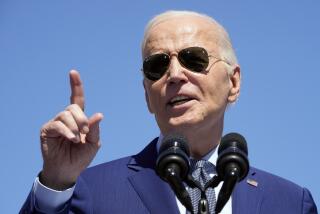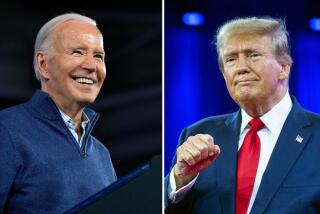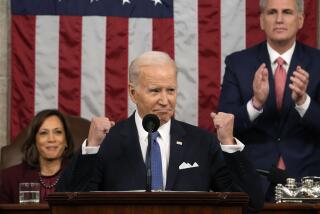A tale of two speeches
Hillary Clinton and Mitt Romney were supposed to leave New Hampshire today as the prohibitive favorites to win their parties’ presidential nominations. It didn’t happen that way. Romney has now lost twice, and Clinton, who ran third in Iowa, found New Hampshire a lot tougher than anyone could have anticipated. Some substantial part of the explanation for their difficulties might be called a tale of two speeches.
One was the address Barack Obama delivered, and the other was the one Romney should have given -- but didn’t.
Obama’s, obviously, was the stunning victory speech after Thursday’s Iowa caucuses; he’s been riding a wave of enthusiasm ever since. Even the sort of seasoned political analysts inclined to cynicism recognized that the junior senator from Illinois had delivered the sort of soul-stirring, landscape-altering address that deserves to be reckoned in a rhetorical lineage that includes, most recently, memorable public speeches by John and Robert Kennedy, Martin Luther King Jr. and Ronald Reagan.
(Just for the sake of historical perspective, it’s worth keeping in mind that eloquence guarantees nothing on election day; William Jennings Bryan’s masterful “Cross of Gold” speech will be studied as long as there are American politics. Nevertheless, American voters rejected Bryan’s presidential candidacy in three elections.)
There were, in fact, two things about Obama’s speech that remain as remarkable as the campaign heads toward Tsunami Tuesday on Feb. 5 as they were in the moment of delivery. The first is that it was, at bottom, a discussion of race in which race never was mentioned. The second is that both red and blue America seem to have heard the same thing -- something worth noting in this bitterly partisan era. Thus, even a reflexively Republican commentator such as Bill Bennett praised the speech for appealing “to the better angels of our nature.”
Race is America’s perennially unfinished business, but what Obama did in Iowa was to offer a new way of talking about it, and it is that -- more than any policy he yet has advanced -- that marked him as a candidate of change. Race remains the great American problem, but it’s a problem whose contours have been dramatically reshaped in recent years. Yes, this still is a society in which young African American men both commit and are victimized by violent crimes in wildly disproportionate numbers and are imprisoned at an alarming rate. It’s also a society, however, in which two successive secretaries of State have been black, as have the recent CEOs of the nation’s largest communications company -- Time Warner -- and two of its biggest financial services companies, Merrill Lynch and American Express.
America is no longer a country of the dream deferred but of the dream realized in unexpected, but perplexingly uneven, ways. Obama, the 46-year-old product of both Harvard Law and community organizing in the Chicago projects, speaks in a new emotional vocabulary that recognizes both achievement and need. It’s a language he has in common with younger voters, who thus far are turning out in huge numbers.
It will be fascinating to see how this message next plays in South Carolina, which has two things neither Iowa nor New Hampshire has -- a substantial African American population and very traditional politics.
Just as surely as Obama’s campaign has surged since his Iowa speech, Romney’s has suffered since he failed to say what needed to be said in Texas a month ago. From the start, the former Massachusetts governor has had to cope with the problem of religious bigotry. One in four Americans say they’re reluctant to vote for a Mormon. That antipathy runs even higher among evangelical Protestants, who make up most of the GOP’s social-conservative wing.
In December, Romney attempted to emulate -- in an attenuated fashion -- John F. Kennedy’s famous 1960 appearance before a group of Protestant ministers hostile to the notion of a Catholic president. Kennedy hit the issue head on, mentioning his Catholicism 14 times, forthrightly embracing separation of church and state and promising to resist any attempt by the church hierarchy to dictate his conduct as an elected official.
Instead of addressing the issue forthrightly, as Kennedy had, Romney temporized and attempted to placate the religious right by soft-pedaling his own faith -- which he mentioned only once -- and by attacking secular humanism and proclaiming his own belief in Jesus Christ.
It wasn’t simply pandering, it was oddly bloodless. How, for example, could a Mormon candidate for the Republican presidential nomination fail to mention that his party’s very first national platform was built on two planks -- the abolition of slavery and the elimination of Mormonism, both of which those first Republicans deemed “barbarous?” How could he not take the opportunity to remind his handpicked Republican audience that, as recently as the 1890s, thousands of Mormon men were arrested and imprisoned by the United States Army or that the U.S. Senate refused to seat a lawfully elected member from Utah because he was a Mormon?
Rather than do those things, he attempted to ingratiate himself to that very sector of popular opinion in which anti-Mormon prejudice remains most intact. In the process, he helped legitimize fundamentalist preacher-turned-pol Mike Huckabee’s naked appeals to Christian voters in Iowa. It’s a pitch Romney -- and America -- are likely to hear a lot more of in South Carolina and beyond, where the evangelical vote is even stronger.
As Romney’s and Obama’s contrasting experiences demonstrate, silence is seldom golden in politics.
More to Read
Start your day right
Sign up for Essential California for news, features and recommendations from the L.A. Times and beyond in your inbox six days a week.
You may occasionally receive promotional content from the Los Angeles Times.






